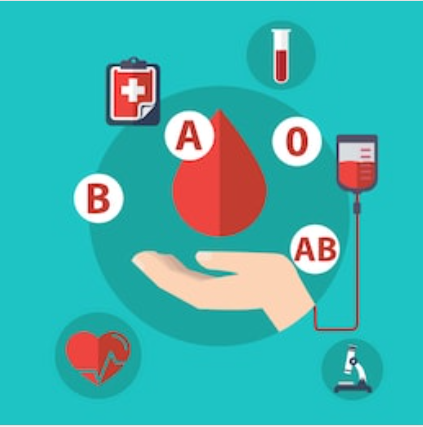
Stress Management Vital for People Suffering Through Type 2 Diabetes
September 14, 2020
Researchers Identify Increase in incidence of Stress Cardiomyopathy during COVID-19 Pandemic
October 17, 2020As the world is facing COVID-19 (corona virus disease 2019) pandemic, recently researchers in different parts of the world conducted studies to find possible links between blood type and COVID-19.
Blood carries oxygen, carbon dioxide, nutrients, immune cells etc. throughout the body. A blood type or a blood group is a classification of blood, based on the presence or absence of inherited antigenic substances (antigens are molecules which could be proteins, carbohydrates etc.) on the surface of Red blood cells or RBCs (cells of the blood which carry oxygen to other body tissues). The antigens are named A, B and AB, if RBCs of an individual have A molecules its blood type A, if the RBCs have B molecule its blood type B, if the RBCs have a both the AB molecules than its blood type AB, and if the RBCs have neither A or B molecule on its surface than its blood type O.
It is interesting to note that there is a molecule known as Rh factor which can be either present +ve or absent –ve. So there are eight common blood types or blood groups determined by presence or absence of antigens on RBCs surface which are:
A+, B+, AB+, O+
A-, B-, AB-, O-
Antigens are substances that can trigger immune responses if they are foreign to human body, so determination of correct blood type is of importance, if blood transfusion is needed.
There are other blood grouping systems also based on presence or absence of other antigens but ABO blood grouping system is the most significant one.
Looking back into the history some studies suggest that susceptibility to develop infectious diseases might be linked to blood type.
A study was conducted in Philippines and was published in 1977, found that people with type O blood were more likely to become infected with cholera bacteria (It causes severe watery diarrhea, which can lead to dehydration), and people with type A blood were less likely to become infected by cholera bacteria.
A study which was published in 1993 suggested that people with type O blood are more likely to become infected with Helicobacter pylori (It’s a bacteria which causes peptic ulcers) when compared with people with blood type A or blood type B, as their gastric mucosa has more receptors for the bacterium.
In 2003, scientists found that blood group antigens functioned as receptors for norovirus (It is a very contagious virus that causes vomiting and diarrhea) docking (molecular docking is the study of how two or more molecular structures e.g. drugs and enzymes or proteins fit together).
During the outbreak of the first severe acute respiratory syndrome corona virus (SARS-CoV1) which began in late 2002, some scientists suspected association between blood type and corona virus infection.
Research data from the past which linked blood type and susceptibility to develop infectious diseases motivated some scientists from Hong Kong and they conducted studies to find a possible link between blood type and SARS-CoV1 infections. They conducted studies among 45 physicians, nurses, medical students, and allied health staff that had been exposed to an infected patient. 34 participants out of 45 had serologically confirmed SARS-CoV1. The researchers found out that health care professionals with type O blood were less likely to have become infected than those with other blood types, and it was reported in 2005 research letter in JAMA.
In recent pandemic caused by Severe Acute Respiratory Syndrome Corona Virus 2 (SARS-CoV-2), scientists in China reported similar association between blood type and SARS-CoV-2. They conducted studies through which they compared the ABO blood group distribution in 2173 patients with COVID-19 from three hospitals in Wuhan and Shenzhen, China, with that in general population in those regions. Researchers found that type A blood was associated with a higher risk for COVID-19, while type O blood was found to be associated with a lower risk for COVID-19. However researchers suggested that further investigations and studies should be conducted to find possible associations between blood type and risks of developing COVID-19.
Furthermore, some studies have been conducted after the Chinese researchers to find possible links between blood type and risk of developing COVID-19 but their findings have not been consistent.
A group of scientists from Europe and Australia, in June, reported the results of a study. They conducted the study by comparing genome data (Data or information regarding the genetic material found in the nucleus of human cells) from 1610 patients with severe COVID-19 and 2205 healthy blood donors. All the participants were from Italy or Spain. Scientists found that when compared with people having other blood types, people who have type A blood had a 45% higher risk of developing severe COVID-19 if infected, while those with type O blood had a 35% lower risk of developing severe COVID-19.
Another group of scientists reported in July in Annals of Hematology that they found no relationship between severe COVID-19 and blood type. The researchers observed no significant connection between blood type and COVID-19 related hospitalization, intubation or death, through studying 1289 people who tested positive for SARS-CoV-2 throughout the Mass General Brigham system (It’s a Boston-based non-profit hospital and physician’s network) from March 6 to April 16 and had a known blood type.
However, multivariate analysis (It involves observation and analysis of more than one statistical outcome variable at a time) found that people with Rh+ve blood type were more likely to test positive for SARS-CoV-2 when compared with people who were Rh-ve blood type, while people with type B or type AB blood were more likely to test positive for SARS-CoV-2 when compared with type 0 blood.
A group of scientists published a research in April which was updated in July. They studied 7770 individuals who tested for SARS-CoV-2, 2206 of whom were positive for the virus, in New York Presbyterian hospital system. The scientists pooled their findings with data from China and United Kingdom and found that among those with Rh+ve blood type, people with type B blood were more likely to test positive for SARS-CoV-2, and people with type O blood were less likely to test positive for SARS-CoV-2. However the research did not provide strong evidence of associations between blood type and intubation or death among COVID-19 patients.
Scientists comment that they are at the stage of trying to determine if this association is even real.
They further suggest that as the basic science on relationship between blood type and COVID-19 is extremely weak, so at least for now, blood type should not be used to identify individuals who become sick with COVID-19 are likely to develop severe disease.
REFERENCE:
Investigating Whether Blood Type Is Linked to COVID-19 Risk






